Milwaukee—this time Another shooting, another rebellion
By Richard B. Muhammad and Dwayne X -Final Call Staffers- | Last updated: Aug 16, 2016 - 11:16:42 AMWhat's your opinion on this article?
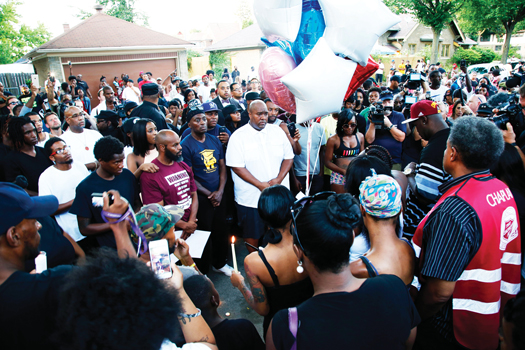
Family members of Sylville Smith and others gather where he was shot and killed by Milwaukee police in Milwaukee, Aug. 14. Police in Milwaukee say a Black man whose killing by police touched off arson and rock-throwing was shot by a Black officer after turning toward him with a gun in his hand. Wisconsin’s governor, meanwhile, has put the National Guard on standby in case of more violence.
|
MILWAUKEE, Wisc.—The physical clean-up is underway but charred buildings and stores destroyed after the fatal police shooting of another young Black male focused attention again on a low intensity war many Blacks feel victimized by.
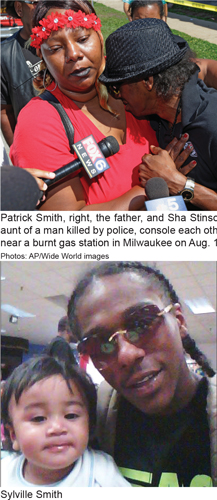
Photo: Facebook
|
“Youth are tired and they’re angry, this is a fire that decades of neglect and abuse has lit,” added another activist.
The fire in Milwaukee isn’t solely for a place once known for brewing beer and manufacturing. This city’s insurrection is the latest in a string of urban explosions the past two years.
But, said activists and leaders, unrest in Milwaukee should not have been unexpected. The city has served as a laboratory for social engineering and has a zip code deemed the worst place for Black children and Black men, they added.
The Honorable Elijah Muhammad, Marcus Garvey, my father, Mike McGee Sr., former alderman, radio host and leader of the Black Panther Militia, and all our ancestors told us this country would not atone for its sins, commented Mike McGee, Jr., who is also a former alderman.
Unrest today is the result of no reparations, no investment, Black men forced and taken from homes and youth fed up with suffering who feel there are no leaders, continued Mr. McGee, Jr.
The answer is separation, he said. America is under judgement for his sins, just as the Nation of Islam Minister Louis Farrakhan has warned, the community leader said.
There are enough professional Blacks, enough plans and proposed initiatives to rebuild the Black community, he argued.
“I think what’s important to understand is these things are not new,” said Reggie Moore, director of the Office of Violence Prevention, which operates out of the city health department.
“Young people in their early 20s have seen a series of injustices gone unchecked and folks not held accountable.”
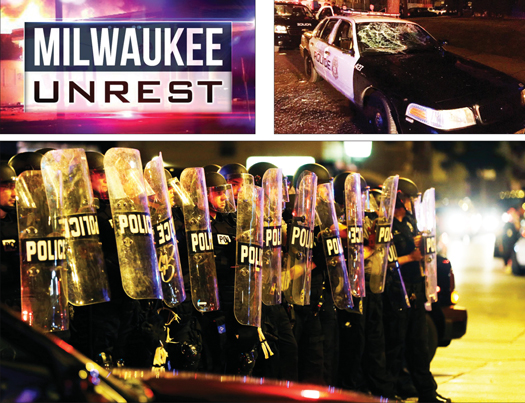
Milwaukee Unrest: Police move in on a crowd throwing rocks at police in Milwaukee, Aug. 14. Shots rang out during unrest after a police shooting that killed a man Aug. 13. Police said one person was shot at a Milwaukee protest on Aug. 14 and officers used an armored vehicle to retrieve the injured victim and take the person to a hospital, as tense skirmishes erupted for a second night following the police shooting of a Black man.
|
Fires, gunshots and rocks thrown at cops
Mr. Moore, Mr. McGee, Jr., and other activists, groups and leaders were in the streets as anger over the Aug. 13 fatal police shooting of Sylville Smith, 23, brought riots and activation of the National Guard. Fires lit the sky and authorities reported gunshots and rocks thrown at police officers who showed up to put things under control.
Like in other cities, Baltimore, Ferguson, New York, Oakland, Atlanta, Dallas, Baton Rouge, Blacks had taken to the streets to express pain and anger.
While mainstream media quickly recited the slain man’s arrest record, including charges for drugs and guns that didn’t result in convictions, the officer involved was unnamed and that made some angry as well.
Mildred Haynes, Smith’s mother, said Aug. 14 police had told her very little about the death of her son, who is a father to a 2-year-old boy. “My son is gone due to the police killing my son,” she told the Journal Sentinel. “I am lost.”
“Online court records show Smith has one prior conviction for carrying a concealed weapon, a misdemeanor. The rest of the arrests did not result in charges or were dismissed,” the Journal Sentinel reported.
Family members described Mr. Smith differently than the focus on his legal problems hinted at. His mother told the Journal Sentinel her son had recently gotten his conceal-carry license because he had been shot twice and robbed four times—and was stripped of all his clothes during one robbery. “She said she doesn’t think her son would pull a weapon on police. She said she could envision him running and hiding,” the Journal Sentinel reported.
It was a beautiful and warm day around Sherman Park on Burleigh St. and Sherman Boulevard when the Black man was running down 44th St. and Auer. The officer involved has been placed on paid administrative leave pending an investigation of the shooting. The officer was wearing a body camera but the video has not been released.
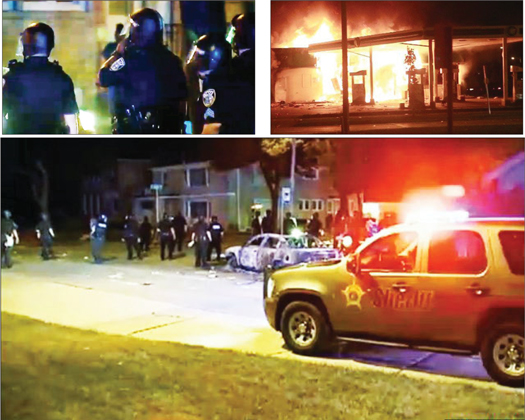
Police during the riots in Milwaukee, Wisconsin. Photo: MGN Online
|
Racism, segregation and Black suffering
Alderman Khalif Rainey, like others, called the area a “powder keg.” Nation of Islam Student Minister William Muhammad of Muhammad Mosque No. 3 spoke on WNOV 860 AM on Aug. 15. When there is injustice in the judicial system, there is an imbalance and there cannot be peace, he said. “The Honorable Minister Louis Farrakhan stated that injustice causes an imbalance in the brain,” he added.
Milwaukee has a long history of deaths associated with police encounters, including Daniel Bell, Ernest Lacy, Dontre Hamilton, Derek Williams, Jay Anderson and others.
The city’s police chief said Mr. Smith, 23, was shot and killed by a Black police officer after he turned toward the officer with a gun in his hand. The killing touched off violence that led to the destruction of six businesses on the city’s mostly Black north side.
TV footage showed a small group of protesters running through the streets Sunday night, Aug. 14, picking up orange construction barriers and hurling them out of the way. Police posted on Twitter three locations where they said shots were fired. Police said an injured officer was taken to a hospital after a rock broke the windshield of a squad car. Police said an 18-year-old Milwaukee man was seriously injured when he was shot during unrest Sunday night.
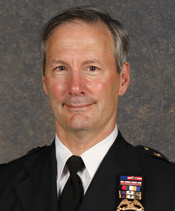
Milwaukee Police Chief Ed Flynn
|
He said the officer told Mr. Smith to drop the gun and he did not do so. It was unclear how many rounds the officer fired. Mr. Smith was hit in the chest and arm, Chief Flynn said.
Some residents were unmoved by that declaration and questioned whether the Black man had been shot in the back.
At the same Aug. 14 news conference, Mayor Tom Barrett said a still image pulled from the footage clearly showed a gun in Mr. Smith’s hand as he fled a traffic stop. Some questioned whether the gun was actually pointed at the officer, or whether the gun was dropped and picked up as the suspect ran away.
“A young man lost his life yesterday afternoon,” the mayor said. “And no matter what the circumstances are, his family has to be hurting.”
Chief Flynn declined to identify the officer who shot Mr. Smith but said he is Black. The police chief said he wasn’t sure what prompted the stop but described Mr. Smith’s car as “behaving suspiciously.”
In addition to the businesses that were burned to the ground, Aug. 13, a Saturday night, 17 people were arrested and four police injured.
Gov. Scott Walker put Wisconsin’s National Guard on standby, and 125 Guard members reported to local armories to prepare for further instructions, although they were not deployed.
Milwaukee County Sheriff David Clarke said Mr. Smith had been arrested 13 times.
Speaking at an evening vigil, Mr. Smith’s sister, Kimberley Neal, told The Associated Press that the family wants prosecutors to charge the officer who shot him.
Nearly 40 percent of Milwaukee’s 600,000 residents are Black, and they are heavily concentrated on the north side.
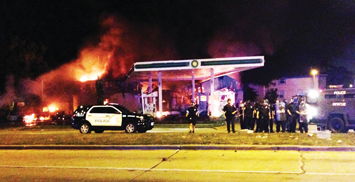
|
In December, the U.S. Justice Department announced it would work with Milwaukee police on changes.
Critics said the police department should have been subjected to a full Justice Department investigation like the one done in Ferguson, Missouri, after the killing of Black 18-year-old Michael Brown in 2014 touched off violence there.
David Muhammad and others described the city as a powder keg and a perfect storm of high poverty, unemployment, intense distrust between community and law enforcement. It is also one of the most segregated cities in the country.
The zip code where everything occurred “53206,” has been declared the worst place for Black children to be raised, 60 percent of men have been in prison, are under some legal control, or been taken out by fratricidal violence, said activists.
Milwaukee was a lab for social engineering with its 1990s welfare to work program, Supermax and private prisons and state privatization of some public functions, activists said.
Decades of racism, violence, a couple generations of economic depression and an affordable housing crisis near Sherman Park, the area where the shooting occurred, last left a legacy of suffering and weakened family life.
It has also bred the pain, anger and grief displayed on its streets.
Mr. Moore, of the Office of Violence Prevention, said young people know something is intrinsically wrong. Some struggle day-to-day doing whatever is necessary to survive and others are part of organized groups learning about systemic failures.
It’s not enough to say, quell the unrest, he said. There must be a focus on policy changes, reallocation of resources and work inside the community to heal itself, he said.
Activists said calling for peace without real change isn’t going to work in Milwaukee or anywhere else. It seems like economic pain, violence and property damage are the only thing the country responds to, some added.
“You can’t call for peace from one segment of the population without calling for peace from all the segments of the population,” observed Mr. Moore.
There is a cumulative effect of trauma that includes losing hope, a lack of communication inside Black neighborhoods and no confidence in law, order and governance, he said. But, Moore warned, there are consequences when people get to that point.
“There has to be a dual focus on the root causes of the unrest and a vision beyond the unrest,” added Mr. Moore.
“Wisconsin, I believe, is the most racist state in the nation,” said Keyon Jackson-Malone, a show producer and show engineer at WNOV 860 AM in Milwaukee, which includes Black talk radio and music. He has worked at “The Voice” four years and works with young people in Sherman Park.
Milwaukee had riots in 1967 and 1968 and in just the last few years Blacks have died dealing with law enforcement or Whites who assumed authority in the city and suburbs, he said.
He joined Von Mayes in working with young people in Sherman Park though police officers may not favor Mr. Mayes, who is able to reach youth.
It wasn’t the youth battling police it was a “grown man’s fight” and young people, neglected and targeted by police for years, joined in, said Mr. Jackson-Malone.
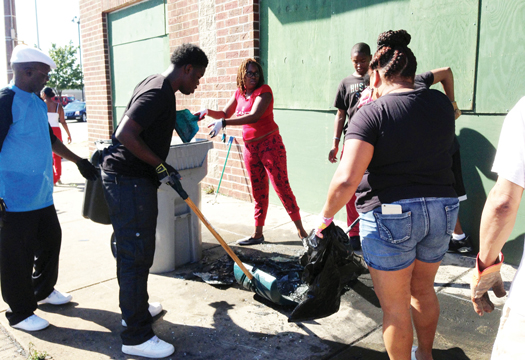
Volunteers sweep and pick up debris, Sunday, Aug. 14, in a north Milwaukee neighborhood that was rocked by hours of late night violent unrest sparked by a police officer’s shooting of a man fleeing a traffic stop. Photo: AP/Wide World photos
|
He and Mr. Mayes are among those who try to nurture, feed and help youth. Every day youth are outside of a Boys and Girls Club that rejects them, said Mr. Jackson-Malone. There doesn’t seem to be the spirit to work with young people anymore, he added.
But, he said, the weekend brought a lot of people together and he hopes it continues. Milwaukee, Mr. Jackson-Malone continued, is not some isolated case.
“It should be looked at as part of a national problem and a cultural problem,” he said. The village culture, with Blacks loving and caring for one another, needs to be reestablished, said the 39-year-old. He called chasing money by adults part of the problem.
David Muhammad, assistant minister at Mosque No. 3, said young people weren’t given credit for curbing destruction and violence. “You should have heard these young people last night. It was the brother (of the shooting victim) who asked people to go home,” he told The Final Call in an Aug. 14 interview.
The unrest is also young people expressing their pain, even if some are involved in self-destructive behavior, he argued. “The reality is are we listening?” asked David Muhammad.
Milwaukee also has a strong Black Power history but there are attempts to disconnect the nationalist movement from the masses of the people, he said. The Fruit of Islam of the Nation of Islam was among groups trying to keep the peace over the weekend.
There are also untold parts of the story: The torched gas station was the target of protests after a clerk came outside and fired a weapon in the air following an incident with youth at the store, said activists.
Mike McGee, Jr., stresses the need for Blacks to save themselves. A recent study found it would take Blacks 228 years to equal wealth possessed by Whites, he noted. In Milwaukee, there is an effort underway to build hoop houses to grow food, engage in urban farming and create a vegetable bus to feed people, said Mr. McGee, Jr.
“If we are not busy building community and a world we will be busy being food for someone else,” he said.
(The Associated Press contributed to this report.)
INSIDE STORIES AND REVIEWS
-
-
About Harriett ... and the Negro Hollywood Road Show
By Rabiah Muhammad, Guest Columnist » Full Story -
Skepticism greets Jay-Z, NFL talk of inspiring change
By Bryan 18X Crawford and Richard B. Muhammad The Final Call Newspaper @TheFinalCall » Full Story -
The painful problem of Black girls and suicide
By Charlene Muhammad -National Correspondent- » Full Story -
Exploitation of Innocence - Report: Perceptions, policies hurting Black girls
By Charlene Muhammad -National Correspondent- » Full Story -
Big Ballin: Big ideas fuel a father’s Big Baller Brand and brash business sense
By Bryan Crawford -Contributing Writer- » Full Story






 Click Here Stay Connected!
Click Here Stay Connected!








